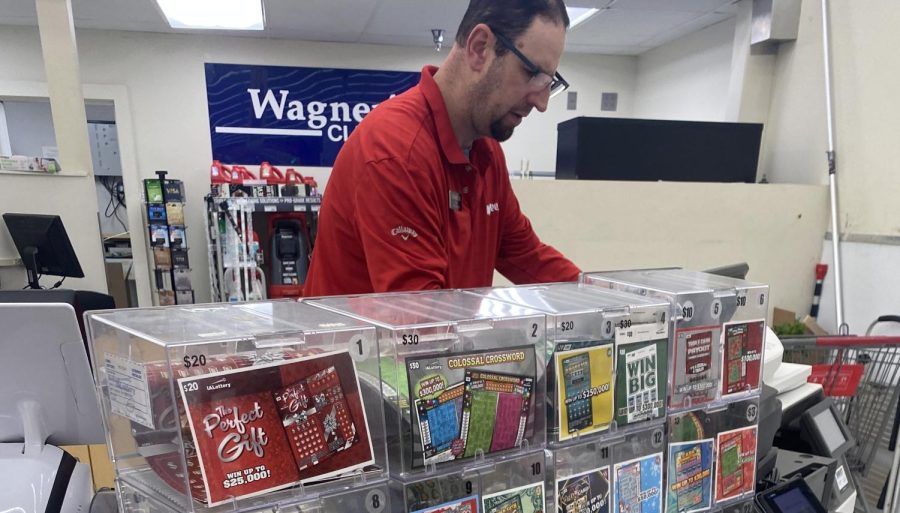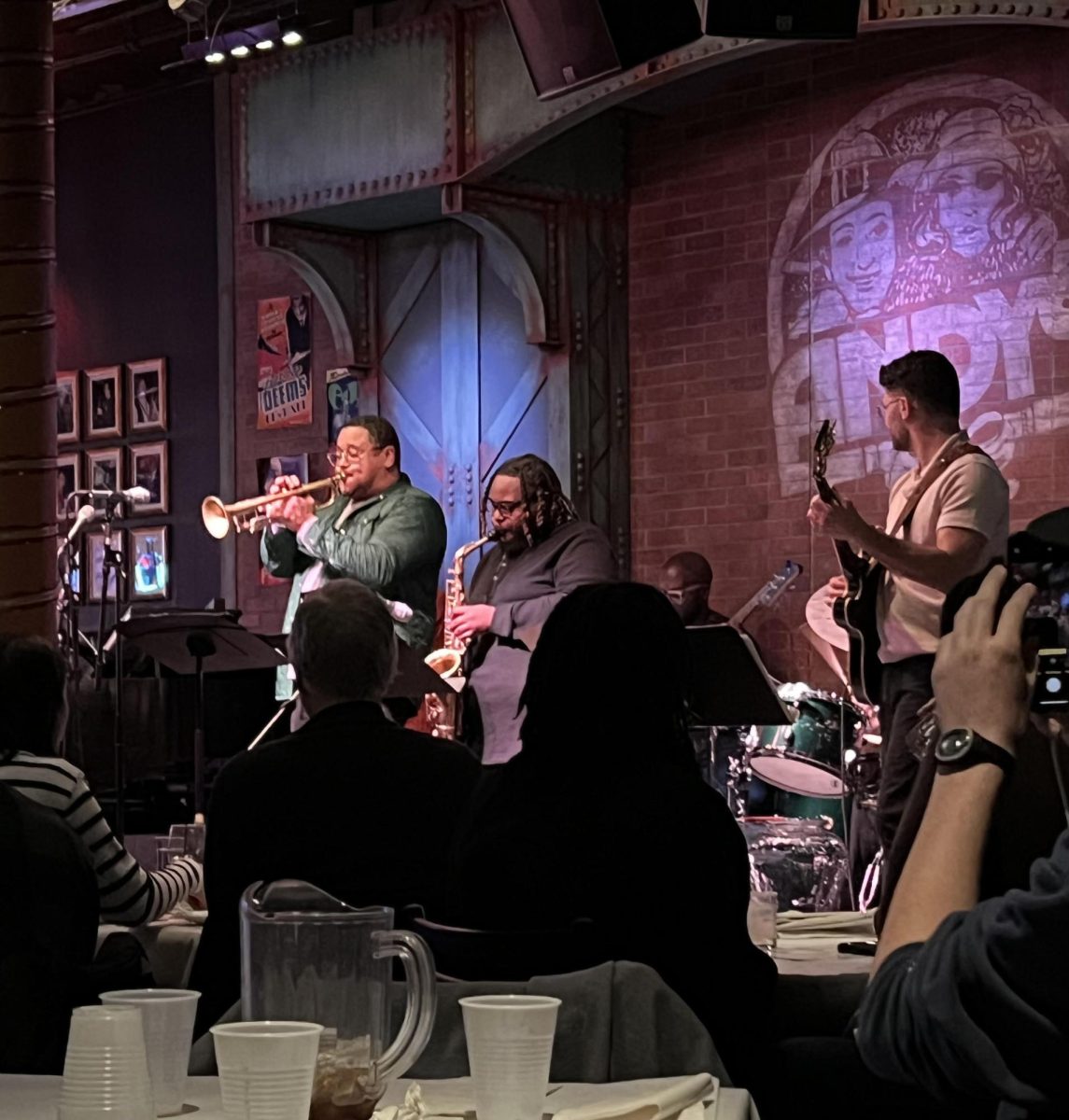The $2.04 billion Powerball Jackpot ended on Nov. 8, with a man holding the “lucky” six-number card. In the weeks prior, the lottery value grew, eventually exceeding the previous record by nearly $400 million. Convenience stores, gas stations and grocery stores saw soaring numbers of customers all hoping for a chance at the illustrious Jackpot prize.
Though the chances of winning a jackpot like Powerball are less than 0.000000003%, American adults spend an average of 285 dollars per year on lottery tickets. The reason? A minuscule chance of winning, no matter the improbable odds
People, even aware of the extremely low chances of success, still invest their money, holding onto any chance that they might be lucky. Ziwei Ren, an accountant at Mitchell Goddard Company LLC, has repeatedly invested money into the lottery. “I buy Powerball tickets around 6 times a year, and I purchase 3 or 4 tickets each time. My thought process behind it is that it’s fun thinking I might have a chance but also if I don’t win, it’s not too big of a deal” she said.
Lottery directors are aware of peoples’ ignorance and use it to their advantage when marketing to the public. Stories of the common man unexpectedly winning are constantly sold to people, making it seem just as attainable for them.
All lotteries are controlled by state governments, and around one-third of the lottery’s profit goes back to the state. It’s again up to the states on how to allocate the funds. States claim the money they receive goes back to the general community fund. For example, Illinois says that the profit “provides critical funding to K-12 public schools across Illinois every year” and that “by By law, revenue from the sale of Illinois Lottery tickets and games is used for prizes, operating costs and contributions to education funding, and other good causes in Illinois”.
The idea that citizens shouldn’t feel guilty when buying a lottery ticket is a facade. The truth is that the majority of the money does not go back to the community. The state-allocated funds are controlled by legislators who aren’t always transparent with their decisions.
“Where Does the Lottery Money Go”, a study done by the Illinois Association of School Board (IASB), reported that the ⅓ portion isn’t always delegated according to plan. “Although lottery profits are deposited in the Common School Fund, that is merely an accounting maneuver that actually reduces the amount of money that schools require from other state sources,” the report read. “The state lottery, unfortunately, will continue to be used as a smokescreen to make it appear that the state is adequately funding schools when, in fact, that is not the case.”
Claiming that lottery funds are being contributed to a good cause is simply a marketing technique preying on the same people the state is so eager to “help”. The people who spend the most amount of money on lottery tickets are those in lower socioeconomic groups (SES). A study done by the University of Buffalo saw those in the lowest fifth SES group had the highest rate of lottery gambling at 61% and the highest mean level of days gambled in the past year at 26.1. Lower income Americans also accounted for the majority of scratch off tickets sales.
The manipulation of lower income groups to continuously fund lotteries’ profit becomes a burden on those people. A false sense of hope conceals the real value of the ticket because the return on the investment more likely than not will be 0, so why encourage people who are already at a disadvantage to pay for social benefits they may never receive?
As the payout drawing lotteries climb extremely high, people will flock to buy tickets even though chances of winning grow slimmer. Erin Klage, an economics teacher, believes many citizens have a narrative associated with winning. “I think the desire to participate stems from a desire to raise social standing. Historians discuss the idea of the “American Dream” and oftentimes this is associated with money and raising your social economic standing. More money is seen as a path to a “better” life” she said.
Even for the winner of the lottery, there are always downsides to the cash prize. While a huge earning is advertised, it does not reflect the reality of what the winner receives. Klage explained how the aftermath of the lottery plays out for the winner. “Obviously, either way, the federal and state governments take taxes out of the jackpot. So even if the jackpot is 1.2 billion, someone probably would only see around 500 million after federal and state taxes and if they take the lump sum right away” she explained.
For over 50 years, marketing campaigns have been successful in selling hope to Americans. As a society, whether or not we participate in the lottery, we need to grow increasingly conscious of our intentions behind buying tickets. As for people who think they’re directly donating to a good cause, that is not the case. If such a cause is the real motivator, money could be directly given to specific organizations.
The fact is lotteries remain incredibly popular, accounting for 66% of all US gambling. While the act of gambling may seem harmless, behind it lies a ludicrous industry that exploits the hope of a common man. Funding the lottery will only promote this futile scheme.
















Cole Pearson • Dec 5, 2022 at 10:31 am
When the powerball jackpot soared to over 2 billion dollars everyone I knew was talking about it. When there is a chance that you don’t have to work for the rest of your life by paying 50 dollars for a lottery ticket everybody will take their chances. No matter how low the chance of actually winning the money are. It seems very interesting to me that lottery money is funding the government but it also makes sense due to the amount of money going into the lottery.
Melody R • Nov 19, 2022 at 2:32 am
I never knew that lotteries funded state governments. They do seem fraudulent in that people are encouraged to participate in this form of gambling under the pretence that the money is used for the community. It’s unfortunate that the hope of a big payout keeps people spending money on something that will realistically never happen.